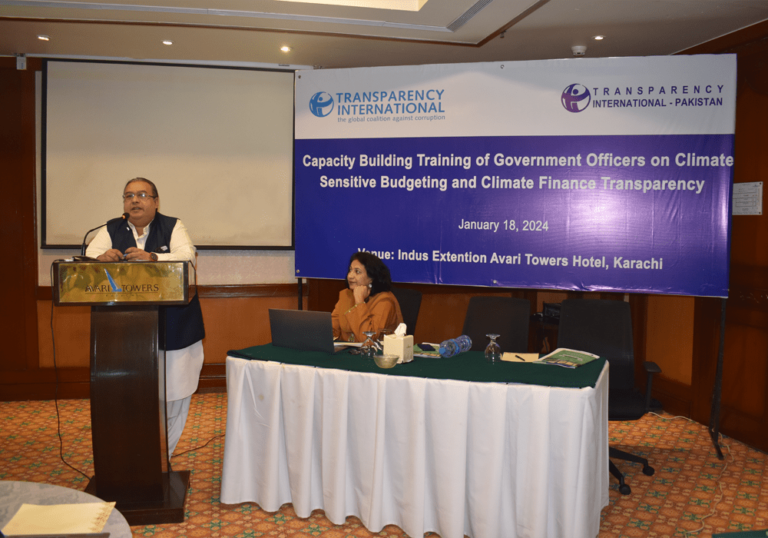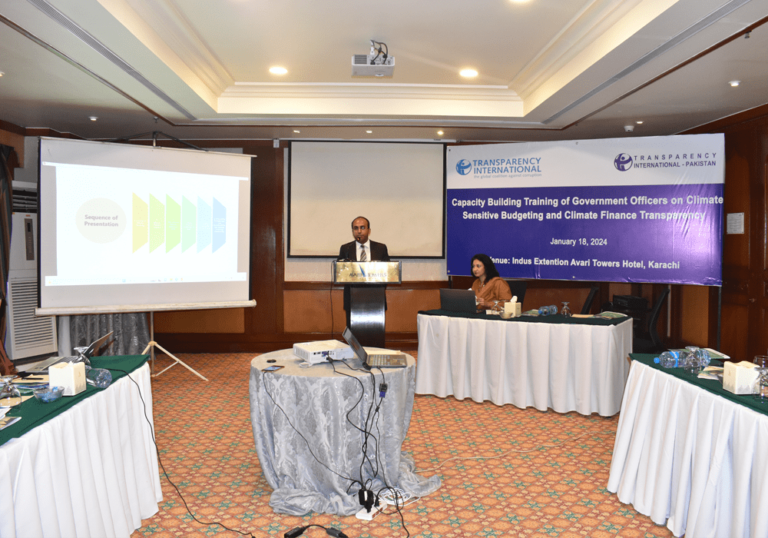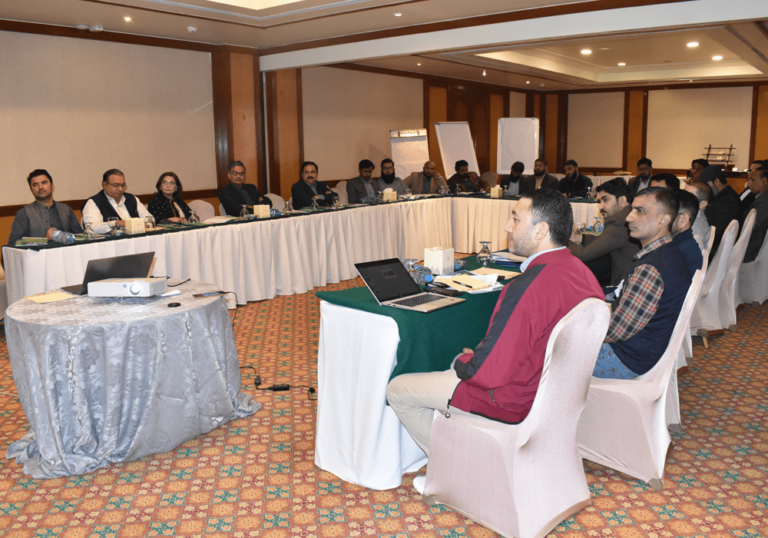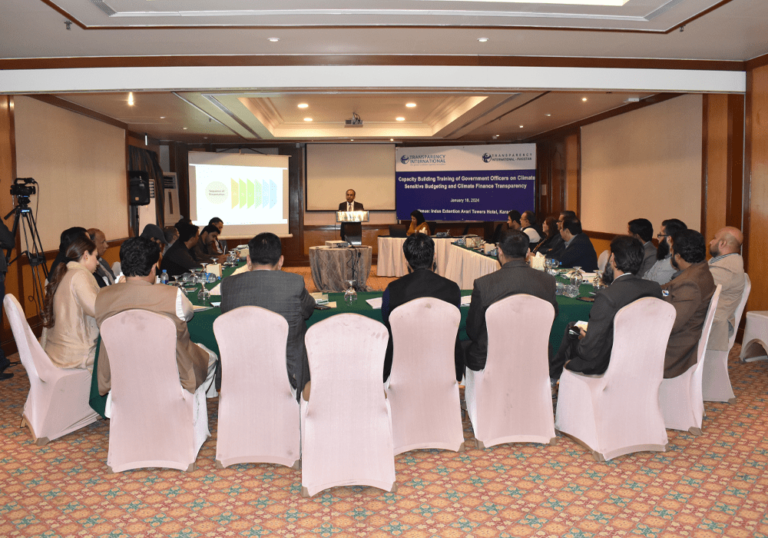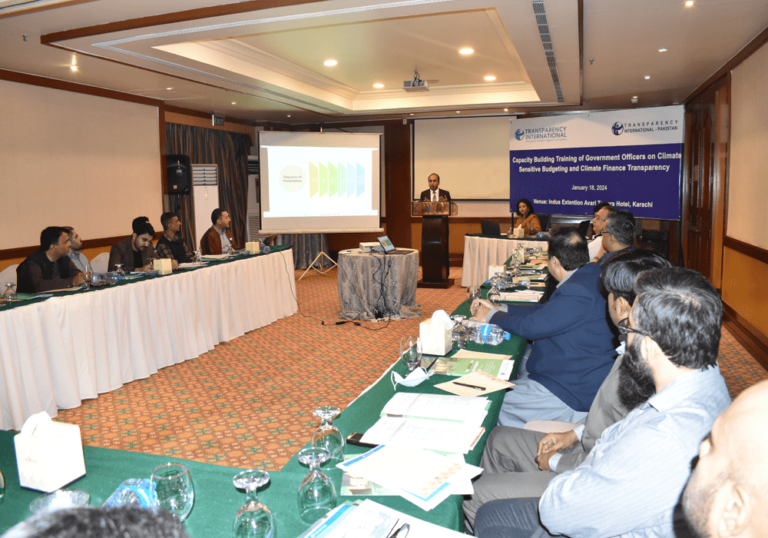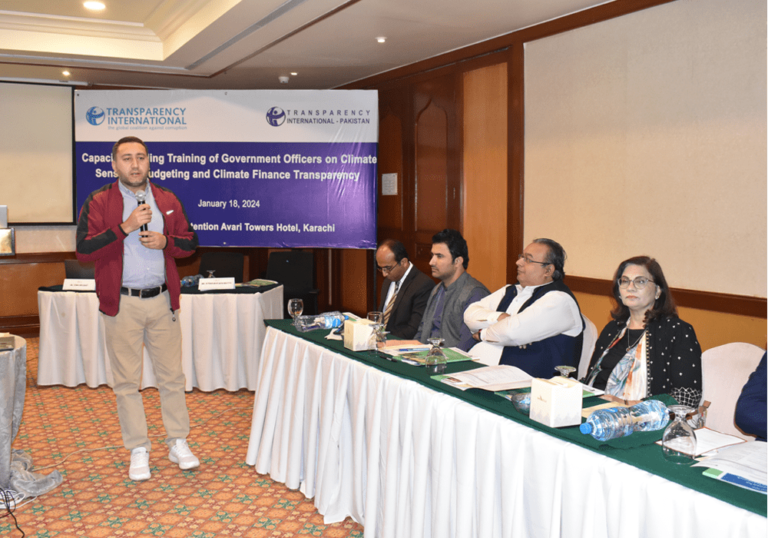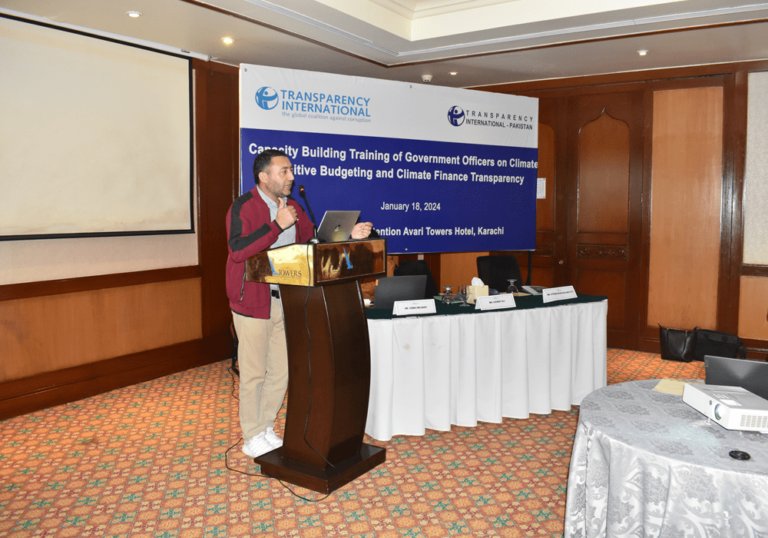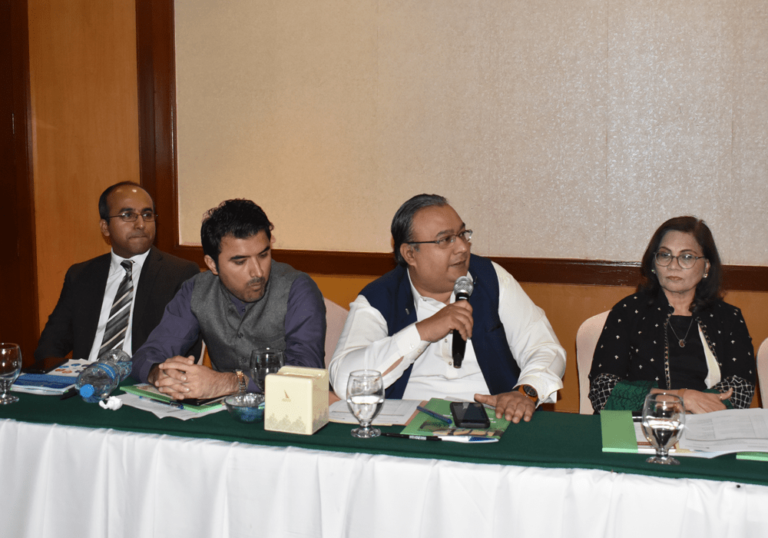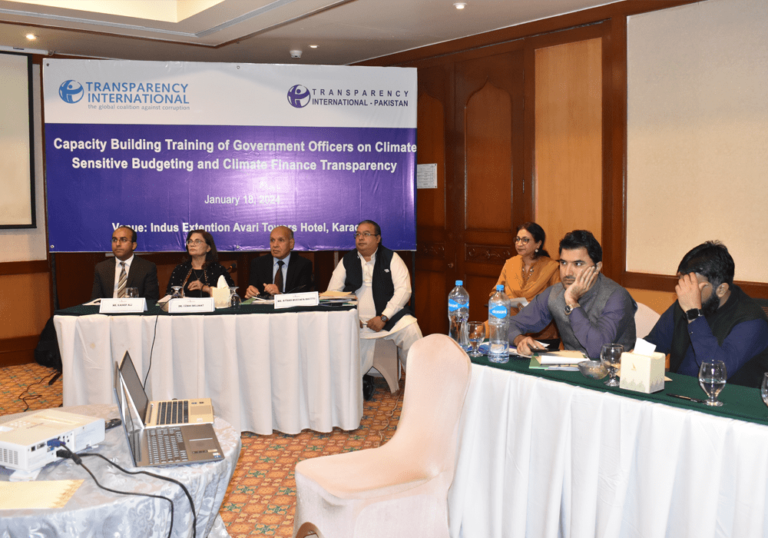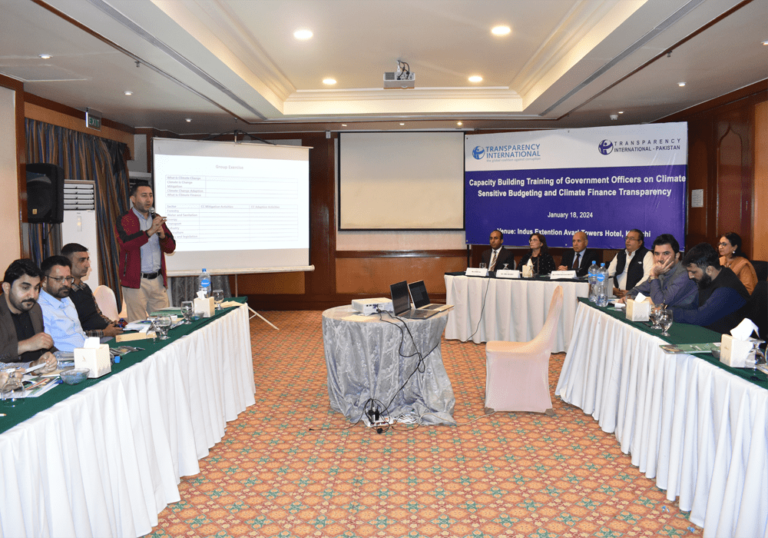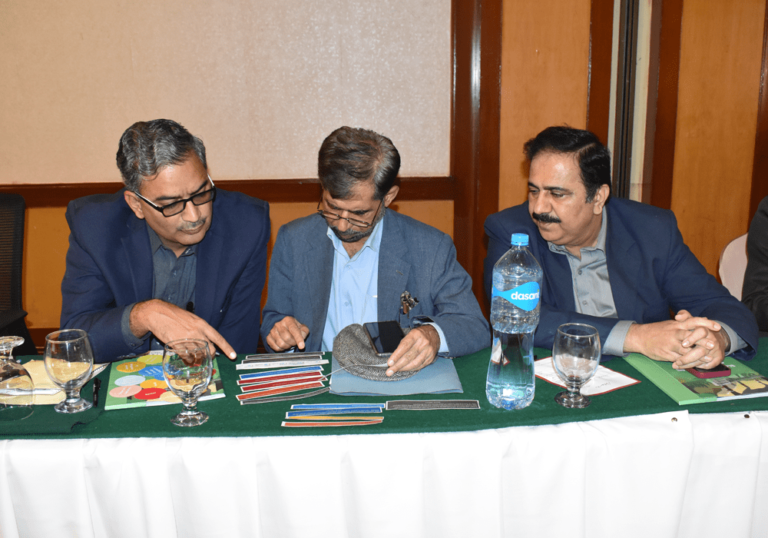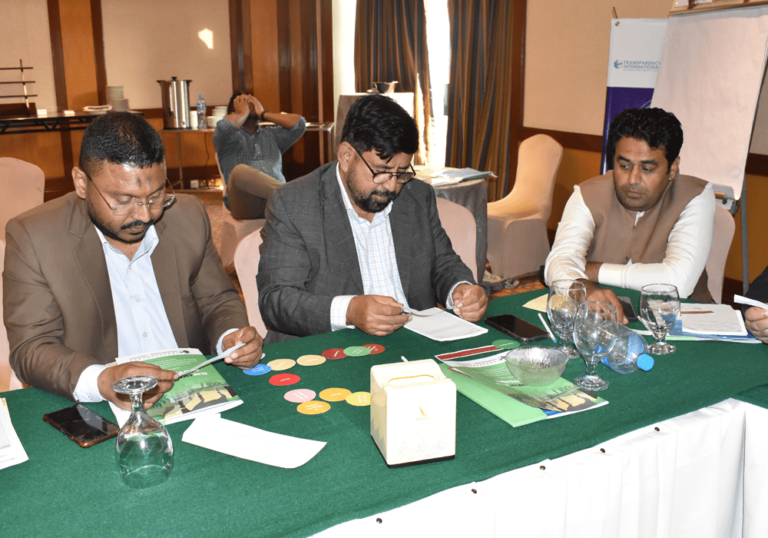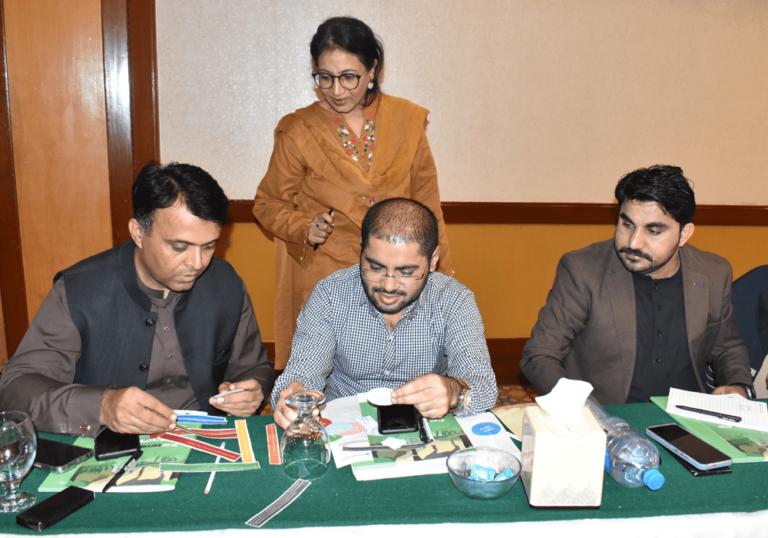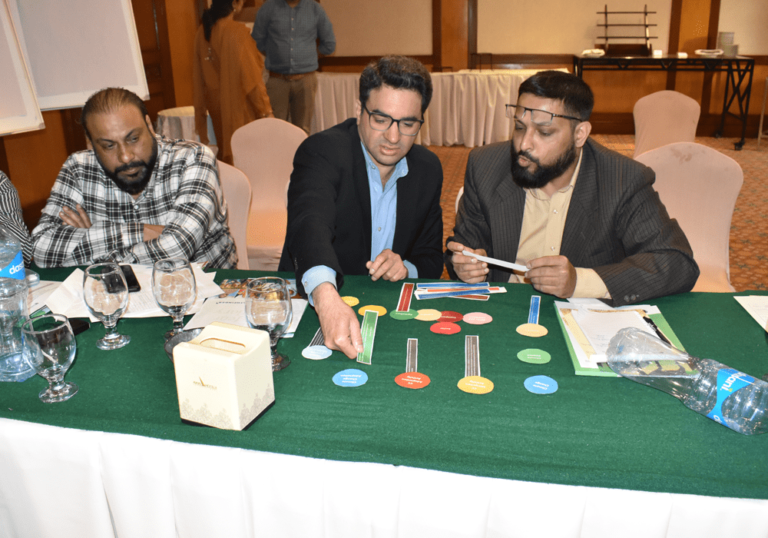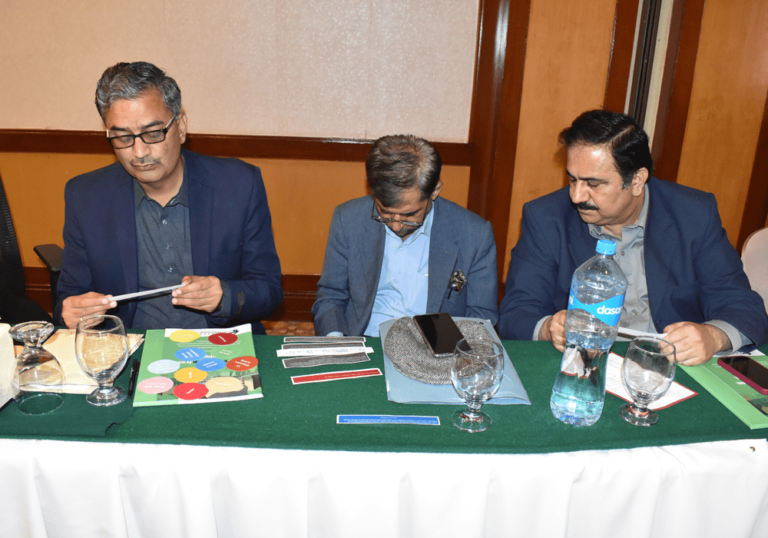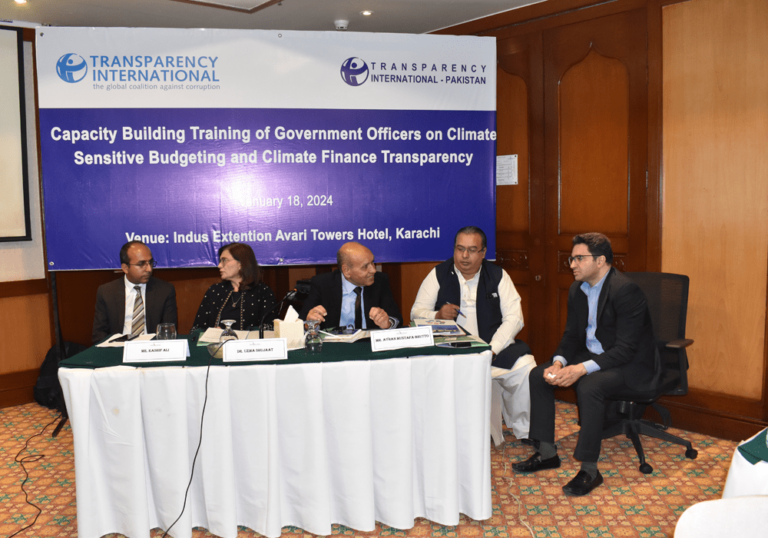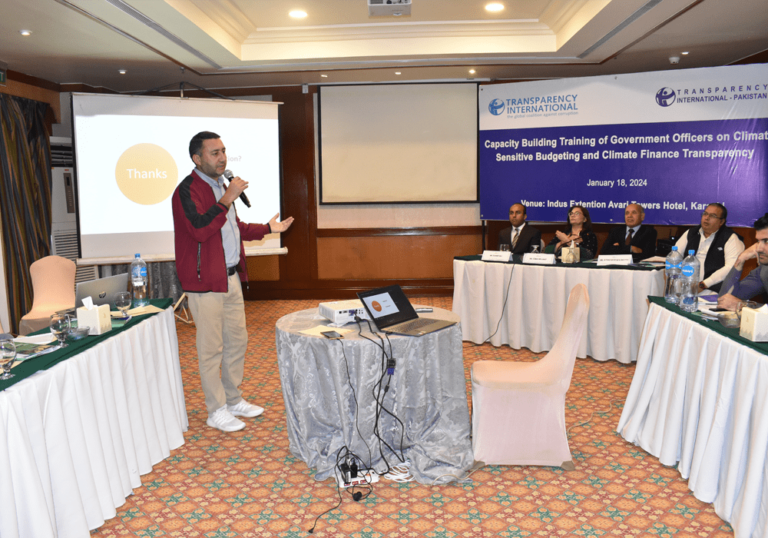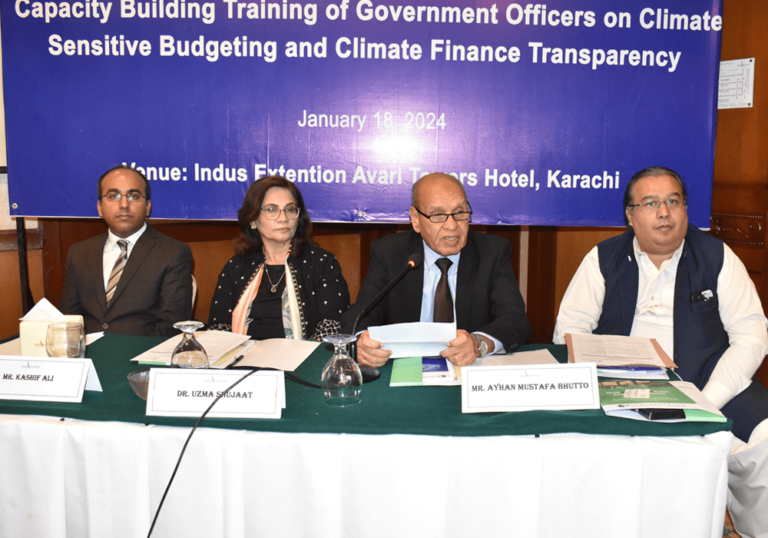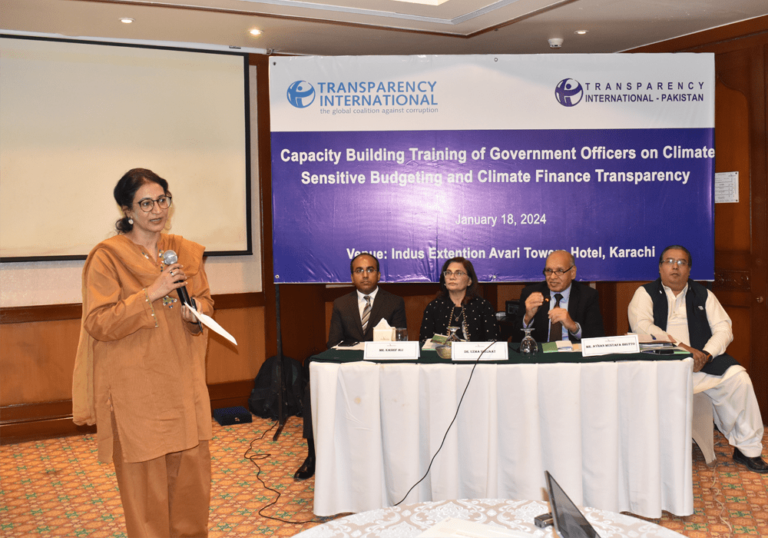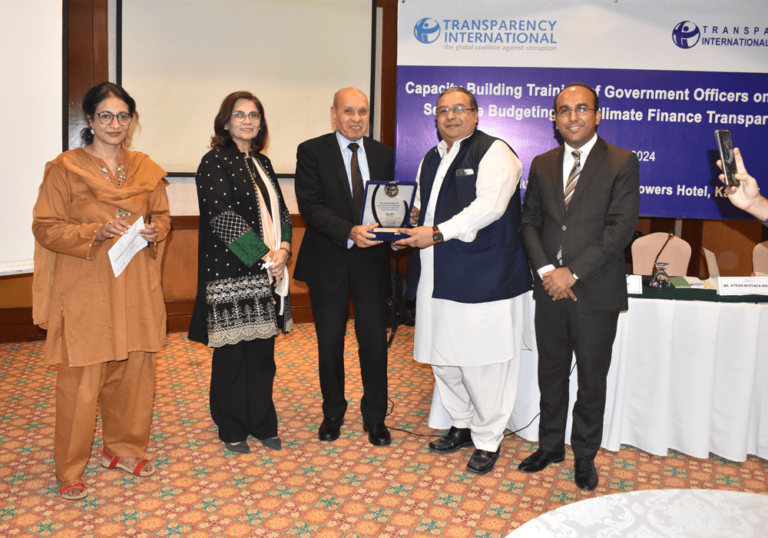- Home
- Capacity Building of Government Officers on Climate Sensitive Budgeting and Climate Finance Transparency
Capacity Building of Government Officers on Climate Sensitive Budgeting and Climate Finance Transparency
Capacity Building of Government Officers on Climate Sensitive Budgeting and Climate Finance Transparency
Venue: Hotel Avari Towers, Karachi
Date: 18 January 2024
Transparency International Pakistan (TI Pakistan) organized a training workshop on Capacity Building of Government Officers on Climate Sensitive Budgeting and Climate Finance Transparency on 18 January 2024 at Hotel Avari Towers in Karachi, Sindh.
The primary objective of the workshop was to enhance the capacity of relevant climate related line departments on understanding climate financing, integrating transparency and accountability in climate financing frameworks and providing knowledge of tools for tracking, monitoring and evaluation of climate finance.
Around 31 senior officers from different departments including deputy commissioners and additional secretary from Climate Change & Coastal Development, Planning & Development, Local Government & Housing and Town Planning, Irrigation, Energy, Forest & Wildlife, Environmental Protection Agency (EPA), Provincial and District Disaster Management Authorities (PDMA & DDMAs), Karachi Metropolitan Corporation (KMC) and Director General of Directorate of Climate Change (DoCC) Sindh attended the capacity building workshop.
The workshop formally started with the recitation of the Holy Quran. Dr. Uzma Shujaat, Board of Trustee, TI Pakistan welcomed the participants and delivered opening remarks. She emphasized on the crucial role climate finance plays in addressing environmental challenges by providing the necessary financial resources for implementation of mitigation and adaptation measures. As Pakistan emphasizes for an access to international climate finance, it is imperative that we overhaul over Public Finance Management (PFM) system with climate lens.
Moving on, Mr. Ayhan Mustafa Bhutto, Director General (DG), Directorate of Climate Change (DoCC), Govt. of Sindh briefed the departments about the efforts of the provincial government addressing the impacts of climate change. He informed that Sindh Environment, Climate Change & Coastal Development Department is the only government department in Pakistan which has received accreditation from Green Climate Fund (GCF). This highlights the proactive approach of the provincial government to access the international climate finance. He shared that Sindh is the only province that has received more than $200 million of carbon credits for its efforts to expand mangrove forests under Pakistan’s commitments for unconditional contribution to a global drive for reducing greenhouse gas emissions.
Mr. Bhutto highlighted that the provincial government is in process of enacting the Climate Change Act and Climate Financing Framework. He also highlighted that to ensure transparency, DoCC ensures that all the procurement information is uploaded on the department’s website.
Moving on, Mr. Kashif Ali, Executive Director, TI Pakistan, provided an overview of Climate Governance Integrity Programme. He highlighted that the project seeks to address the endemic of corruption by working with different groups and stakeholders to ensure that climate action in Pakistan is inclusive and transparent. He said that the objective of the training is to enhance the capacity of relevant climate departments on how to align their budgets with climate change, providing the knowledge of tools for tracking and monitoring of climate finance, developing climate finance budgeting and global best practices for it.
Afterwards, Mr. Amat Shahi, Disaster Risk Financing Expert, conducted a detailed session on Understanding Climate Finance. By engaging all the participants with an interactive presentation, Mr. Shahi gave an overview of climate finance landscape in Pakistan and said that Pakistan needs $10 Billion to rebuild from 2022 floods and so far Pakistan has received only $131 Million from Green Climate Fund.
He said that Sindh, being a coastal area, confronts heightened threats from rising sea levels and extreme weather events. Given the region’s vulnerability to climate change, effective management and monitoring of climate finance is imperative. Mr. Shahi discussed the significance of national and international funding in Sindh, outlined the entities engaged in climate finance, and highlighted the private sector’s investments in ongoing climate projects in the province.
Followed by the tea break, Mr. Kashif Ali, Executive Director, TI Pakistan gave a presentation on integrating transparency and accountability in climate financing frameworks. He told the participants that Pakistan suffers an average loss of US$4 billion annually and has set a conditional target of achieving overall 50% reduction in emissions by 2030 as per the NDC 2021. However, the country has made limited progress in establishing a suitable and well-integrated climate finance regime.
He explained Pakistan’s Public Financial Management (PFM) system through a climate governance lens and highlighted the approaches to climate responsible budgeting. He provided a top-down guidance that Budget Strategy Paper (BSP) should have financial framework for climate change that is based on NCCP and “Framework for implementation of NCCP” already developed by MoCC. He said that project preparation guidelines like PC-I & PC-II should be updated to integrate CC at this stage and PC-I, besides EIA/ESIA, should also include a Climate Benefit Assessment. He also shared that TI Pakistan is creating a baseline for government departments on how to develop climate sensitive budgeting, incorporating transparency in the climate financing frameworks.
Mr. Kashif also shared the budgetary allocations and climate spending for the year 2023 and said that the flows of climate finance have been paltry and the limited funding is largely in the form of Billion Tree project.
After the lunch break, Mr. Azmat Shahi discussed the tools for tracking, monitoring and evaluation of climate finance. He highlighted that “Climate Budget Tagging” (CBT) is one of the tools designed to help countries mainstream climate change in public financial management.
He also presented some crucial tracking tools to monitor climate finance which includes different financial mechanisms, open data platforms and global climate finance platforms. He informed the participants that Climate Policy Initiative and Climate Funds Update offer real-time insights into global finance flows.
Mr. Shahi engaged participants for a group activity where participants revised their basic understandings on climate change, climate finance and other terminologies. They were asked to identify mitigation and adaptation strategies for different sectors such as transportation, energy, forestry and agriculture. This collaborative session fostered a deeper understanding of how these strategies can collectively contribute to climate resilience and sustainable practices.
Moving on, Mr. Raza Gardezi, RTI Expert, delivered a detailed presentation on Right to Information and its Application in Climate Finance. He briefed that issues impeding climate finance in Pakistan are lack of institutional capacity, weak governance, political and economic instability. He said that the Constitution of Pakistan gives right to every citizen for acquiring information and/ or record held by any Public Body including the departments related to climate change.
He also outlined the potential penalties a department may face for not providing the necessary information. During the comments and Q/A session, participant’s also shared their challenges while providing the information under RTI requests, fostering a valuable exchange of insights and experiences among the attendees.
Towards the end, Justice (R) Zia Perwez, former Judge Supreme Court of Pakistan and Chairman TI Pakistan delivered the concluding remarks and expressed his gratitude to all the speakers and participants for joining the crucial workshop. He said that managing climate finance effectively in Pakistan can help the country adapt to the changing climate, reduce the risk of natural disasters, and safeguard the livelihoods of millions of people dependent on climate-sensitive sectors. He said the that the participant’s role as champions of climate finance transparency is pivotal in fostering trust, accountability, and effective resource allocation.


